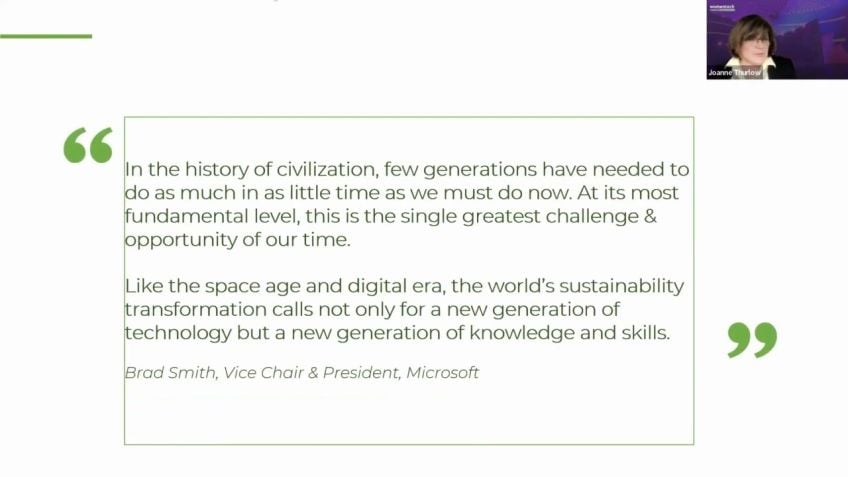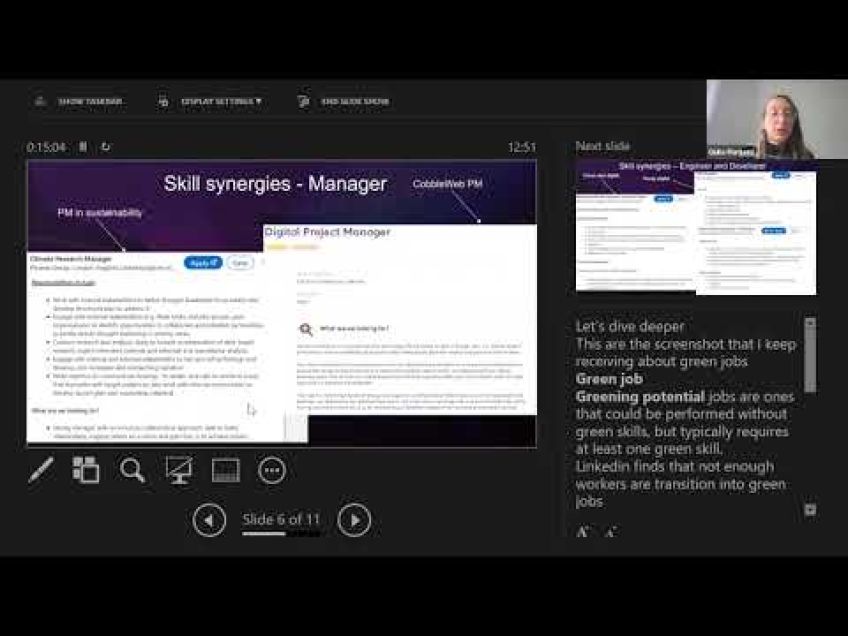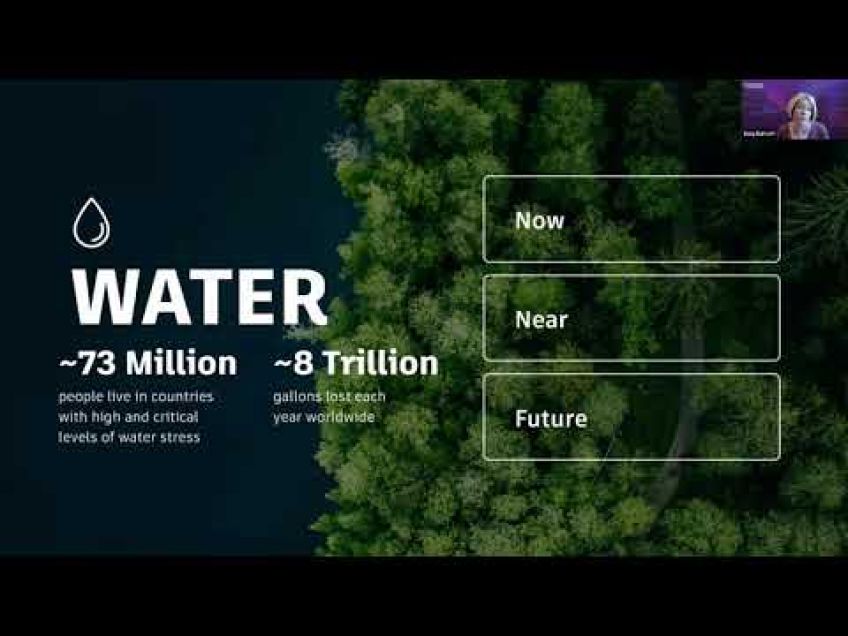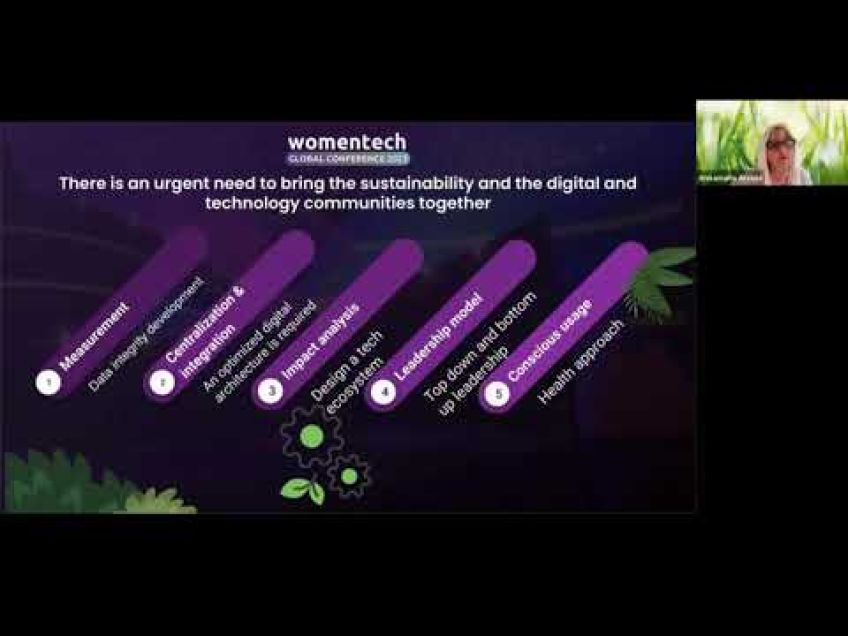Women Leading Climate Action: Building Trust and Creating Inclusive Solutions for a Sustainable Future
Leila Toplic
Chief Communications and Trust OfficerReviews
Leading Equitable and Trustworthy Climate Action: The Essential Role of Women in the Climate Crisis
Good morning, ladies! As we unite in our common cause at this Women in Tech conference, I'm excited to discuss how we can contribute to creating an equitable and sustainable future for all. Today's topic addresses the urgent global issue of climate change and underscores the unique role women can play in tackling it.
The Urgent Nature of the Climate Crisis
Unfortunately, the pressing nature of the climate crisis demands our immediate attention. Over the past five decades, climate-related disasters have increased fivefold, with such disasters occurring on average every single day. Nearly half of the world's population now resides in areas particularly susceptible to the effects of climate change.
Like a ticking time bomb, the number of people displaced annually due to climate-induced circumstances already surpasses 20 million. Moreover, by 2030, the demographic requiring international aid may shoot up by 50% owing to climate change consequences. It's clear that our planet is undergoing dire transformations, and it is our responsibility to act now to mitigate this crisis.
Aim: A Trustworthy and Equitable Climate Action
Our approach to tackle the climate crisis must involve a focus on building trust and ensuring equity at its nucleus. Our ability to understand, incorporate and cater to the needs and perspectives of the communities most affected by climate change is paramount. Open communication, transparency and collaborative action with these critical stakeholders will, therefore, be essential in crafting comprehensive solutions.
Building Trust in Climate Action
A significant aspect of fostering trust involves transparency in technologies like carbon removal. My work, for instance, is focused on creating end-to-end traceability of carbon, assuring that it is effectively removed from the atmosphere and stored for generations to come.
Promoting Equitable Climate Action
The discourse on climate action should also be a conversation about equity. Unfortunately, those most affected by climate change are often those less equipped to adapt, creating an unequal distribution of impact.
Women: The Forerunners of Trustworthy and Equitable Climate Action
It is here that women can provide distinctive contributions. While gender should not dictate one's degree of commitment or responsibility towards climate change, let's focus on a couple of reasons that specifically highlight the importance of women's leadership:
- Unique insights: Historically, women have been the backbone of communities and families. This societal role has equipped them with unique skills, perspectives, and experiences that can lead to innovative climate action.
- Direct impact: Women, unfortunately, bear a larger share of the consequences of climate change. For instance, four out of five people displaced by climate disasters are women. These disproportionate effects make women a crucial inclusion in climate action's decision-making processes.
Addressing the climate crisis requires us to harness women's competencies in different ways. For example:
- Women's traditional knowledge and expertise in food production and water management can be drawn upon for sustainable agriculture and water conservation policies, key factors in climate action.
- As women in tech, we can apply our technological savvy to create innovative solutions to address the climate crisis. For instance, leveraging artificial intelligence to adapt agriculture to climate changes or predict and avert natural disasters.
Conclusion: Women’s Leadership Takes Center Stage
Above all, our climate crisis demands trustworthy and equitable action. At this critical juncture, women's leadership is more critical than ever if we are to create a just and livable future for all. The clock is ticking, and we must unite in accelerating progress towards our collective climate goals.
I urge you to reflect on your contribution to our collective climate goals. Let's join hands to drive trustworthy, inclusive solutions for a sustainable future.
Feel free to reach out if you'd like to learn more about women's leadership in climate action or my work at carbon future. Thank you for your time.
Video Transcription
Good morning, everyone. I'm thrilled to be here at the women in tech conference with all of you today. As women in technology, we have both the responsibility and the ability to create an equitable and sustainable future for all.And that's why I'm here today to talk to you about the most pressing challenge of our time. The climate crisis, the urgency of the climate crisis cannot be overstated over the past 50 years. The number of climate related disasters has increased five fold, a disaster related to a weather, climate or water hazard occurred on average every single day. Over the past half century, nearly half of the world's population lives in contexts that are highly vulnerable to climate change.
Over 20 million people are with victims to climate induced displacement every year and by 2030 in less than seven years, the number of people needing international aid and assistance is expected to rise by up to 50% because of the effects of climate change. We are at a critical moment where we must take bold action and unprecedented action to confront this crisis and we need to work together to drive both effective and impactful climate action now. And I believe that at the heart of this effort are trust and equity. So let me talk about trust. First, trust is crucial to driving the effective climate action because the climate crisis is a complex and urgent challenge that requires co ordinated and sustained action from everyone from governments, from businesses, civil society and individuals.
And to effectively this challenge, we need to build trust with stakeholders including the communities that are most affected by climate change. This means listening to and understanding the perspectives and needs of communities and involving them in the decision making process and co creation of solutions to a climate crisis. Um Now trust is crucial, not only for collective action and collaboration but also for the solutions themselves such as carbon removal, which is what I focused on in my daily work. So let me explain very briefly. Carbon removal technologies such as biochar, carbon removal or enhanced rock weathering or direct air capture, rely on the long term storage of carbon dioxide. So for carbon removal to be trustworthy, we need to provide transparency through end to end traceability of carbon and ensure that it has been effectively removed from the atmosphere and safely stored for the long term for the centuries to come. And that's the work we do our carbon future leveraging both digital technology in a robust sense of methodologies and standards. This is just one example that illustrates how the impact of climate solutions is intrinsically linked to building trust.
And if there's one thing you take away from this is that the intentional commitment to building and operational trust matters for the success of our climate effort now to create a just and livable future. For all we uh the climate action must not only be trustworthy but also it needs to be equitable. So I believe that women are uniquely positioned to drive trustworthy and equitable climate action. I'll just provide a couple of reasons. I'd love to hear from you in the chat, Linda, what are some of the other reasons for women to be leading trustworthy and equitable climate action? First, women have always been at the the backbone of society working tirelessly to keep communities and families running as a result, women have developed unique skills, experiences and perspectives that make them particularly well suited to lead climate action and women are disproportionately affected by the climate crisis facing the brunt of its consequences.
Today, four out of five people, they are forced to leave home their homes due to climate disasters are women worldwide. Nearly half of the agricultural workers are women and we know that agriculture has been severely affected by climate change, whether it's droughts, floods or other disasters.
And despite being largely responsible for feeding and caring for the world, women don't have access to the same information, knowledge or resources as men which makes them particularly vulnerable to the impacts of climate change. Now the fact that women are disproportionately impacted by climate crisis only underscores the need for their leadership in driving trustworthy and equitable climate action. So you might ask, well, how can women's unique skills and experiences translate into concrete action to address the climate crisis?
So let me give you two examples. And again, I invite you to share in the chat window, your own examples. Firstly, women play a critical role in food production and water management in their communities. Oftentimes actually using traditional knowledge and practices to manage natural reason, resources sustainably and for the generations to come. This makes them natural leaders in sustainable agriculture and water conservation efforts, which are key parts of our climate action.
And then through my work with global NGO S, I've actually seen firsthand how women's leadership and expertise have been essential in implementing effective solutions to climate challenges in their communities locally by incorporating these practices into modern day climate resilient.
Agriculture, women can lead the way in building a more sustainable food system that benefits both the communities, the people and our planet. Secondly, we women at the women in tech conference as women in tech have the expertise and skills required to address the climate crisis.
I've spent over 20 years in tech and I know firsthand that technology plays a crucial role in creating effective solutions to some of the world's most pressing problems, whether it's in start ups, social impact organizations, governments or at the community level. Women are at the forefront today of creating innovative solutions to climate challenges such as using artificial intelligence to adapt agriculture to climactic volatility or to ensure that everybody gets food on the table, predicting natural disasters or deforestation before they occur and triggering interventions that protect the communities and the environment or removing carbon from the atmosphere and storing it for the centuries to ensure that we do have a livable future.
If there is one thing you take away from this talk, it is this the climate crisis requires trustworthy and equitable action. And women's leadership is more critical than ever if we are to create a just and livable future for all. Now, we stand at a pivotal moment where we can still make a difference, but the time is running out, the window of opportunity is rapidly closing and we cannot afford to wait any longer. So I challenge each of you to think deeply about how you can contribute to accelerating progress toward our collective climate goals. Let's unite in our efforts to build trust and to create inclusive solutions for a sustainable future with women at the forefront of climate action.
I thank you for your time and I look forward to any questions and comments you might have. So I'll take a look at the chat window right now and you're also welcome to come off mute. If you'd like to ask any questions directly, I think we're actually out of time So, thank you very much. Feel free to reach out if you'd like to learn more about women's leadership in climate action or some of the work that I'm doing today as carbon future. Thank you.







No comments so far – be the first to share your thoughts!